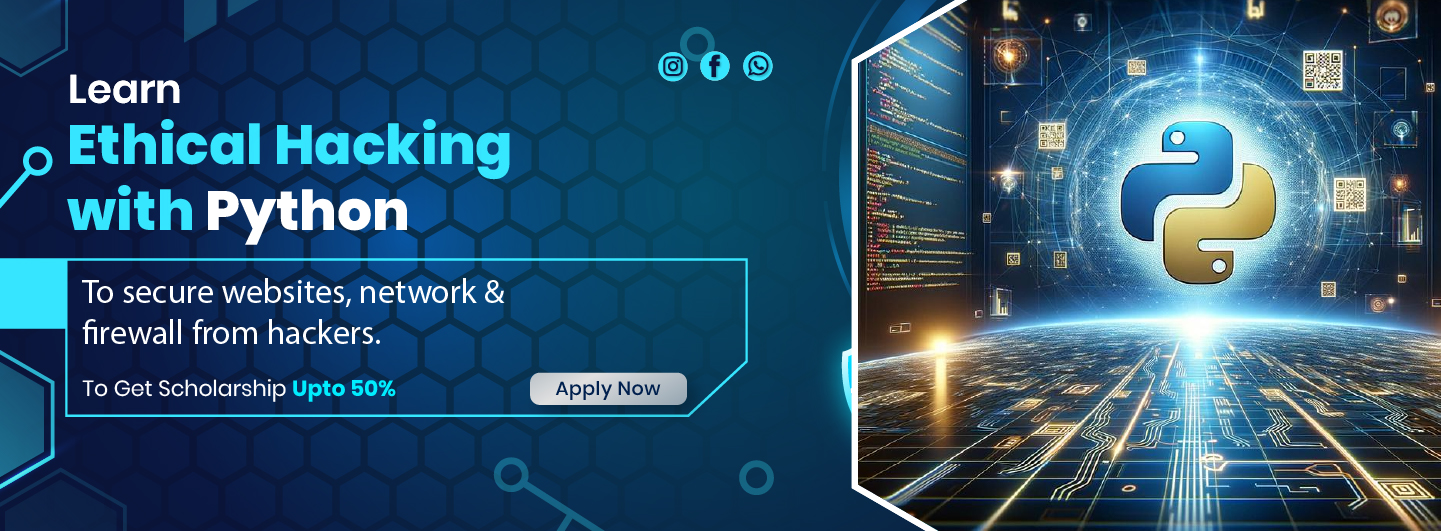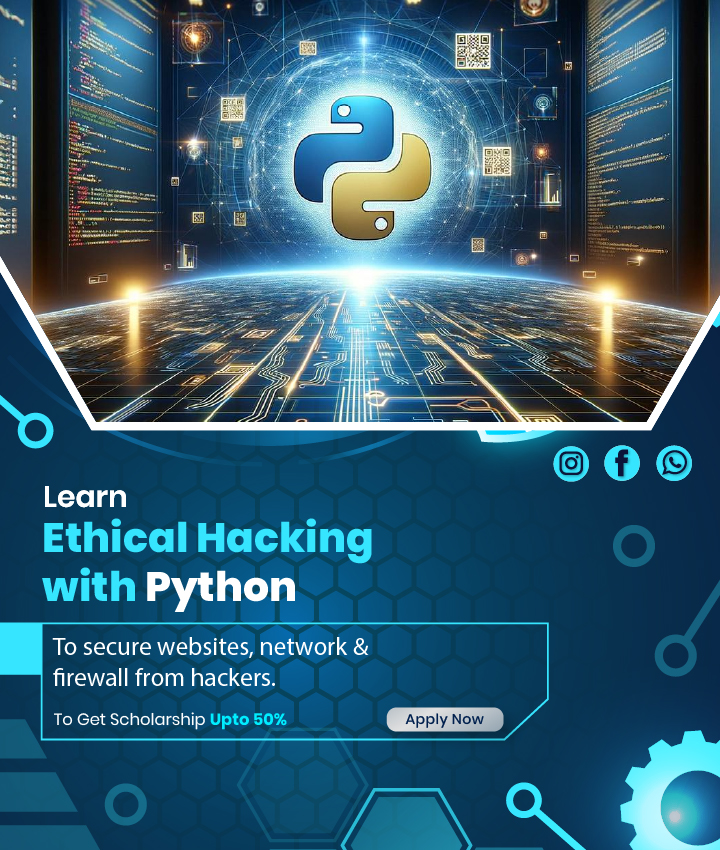


Ethical Hacking with Python Course provides you with the hands-on training required to master the techniques hackers leverage to penetrate network systems and fortify yours against them. You will understand the concepts of hacking using Python and learn to protect businesses from malicious hackers and data breaches. This course provides a deep & detailed concept so that you will become a confident and professional ethical hacker.
Course Highlights
1. |
Port and vulnerability scanning |
2. |
SSH and FTP attacks |
3. |
Password cracking |
4. |
Sniffers, flooders, and spoofers |
5. |
Website penetration testing |
6. |
90 Hours Of Training |
7. |
26 Course Module |
8. |
1 Year Free Backup Classes |
Learning Outcome
| • | Able to Research the company's system, network structure, and possible penetration sites. |
| • | Able to conduct multiple penetration tests on the system. |
| • | Able to Identify and record security flaws and breaches. |
| • | Able to Identify areas of high-level security. |
| • | Able to Review and rate the security network. |
| • | Able to Create suggestions for security upgrades. |
| • | Able to Compile penetration test reports for the client. |
| • | Able to Conduct penetration tests once new security features have been implemented. |
Software and Apps that you will learn in this course





.webp)


Course Content
Jobs You will Get After Completing Course
In this digital era, the demand for ethical hackers is increasing worldwide and will require 80 thousand ethical hackers to secure the data, auditing, and many more in India as well as other countries too. You can explore yourself and get many job opportunities in IT sectors with handsome salary packages.
| Job profile After completing this course |
Average salary ( 1+ year experience) |
|---|---|
| Security Engineer | 29K-31K |
| Security Analyst | 27K-29K |
| Security Software Developer | 34K-37K |
| Specialists in Data Security | 30k-50k |
| Security Executive in Application | 40k-70k |
| Security Auditor | 40-80k |
| Certified Programmer in Security | 45-80k |
| Manager in Web Security | 80k-150k |

Backup Class

Flexible Timing

Fees Installment

Expert Trainer

100% job assistance

Free Library
.webp)
Live Project
.webp)
Practical learning

Hello,
My name is sarita,I'm student of IFDA institute. IFDA is the best computer training institute. Overall I love all the classes I have taken through IFDA institute,all the instructiors are kind and petient.They are very experienced in the program they are teaching.I have recommended this site to my school and friends. IFDA provides both practical and theoretical classes. Had a great experience here.☺️

I have a great experience in IFDA. The trainers are very supportive and explain every topic in detail. This Institute also provide backup classes on Saturday. I would like to suggest to join IFDA Institute to my friends and relatives. Thank u

I consider it very helpful because when when I first got into IFDA institute, it was very friendly and my knowledge in technology has gotten just not better but best. All the faculty here are very polite and ready to help whenever asked. Getting in this institute was my best decision.

0k +

0k +

0+
.webp)
0+
Frequently Asked Questions
An individual planning to become an ethical hacker will need to learn about python language, which considered to be a vital step. A variety of software programs are now available that make ethical hacking easier, however, if you want to know how it is done, you will definitely need the basic knowledge about python programming.
The general eligibility criteria to study Ethical Hacking Courses after 12th at Diploma or Certificate or UG level is to at least pass 10th or 12th.
Yes, IFDA offers In-depth Practical Training in Ethical Hacking Course. You will get practice from industry expert ethical hackers.
IFDA has been working for student’s placement since 2014 and have placed many students in their desired field. It has tie-up with numerous companies/firms which in turn helps it to provide 100% employment opportunities to students.
IFDA has emerged as the most encouraging & favorable institute in Delhi which is an ISO certified computer training institute ,started in the year of 2014. We provide various Govt. and Non Govt. Courses to all the desired students.
Yes, we provide weekly classes and allow flexible scheduling based on your availability. We also offer online and backup classes so you can attend missed or pending lectures.
 (1).png)
 (1).png)
 (1).png)
 (1).png)
 (1).png)
 (1).png)
Get free counselling by our experience counsellors. We offer you free demo & trial classes to evaluate your eligibilty for the course.
GET
COMPREHENSIVE
LEARNING EXPERIENCE
You are just one step away From becoming the future of design. Make your first move and enquire now